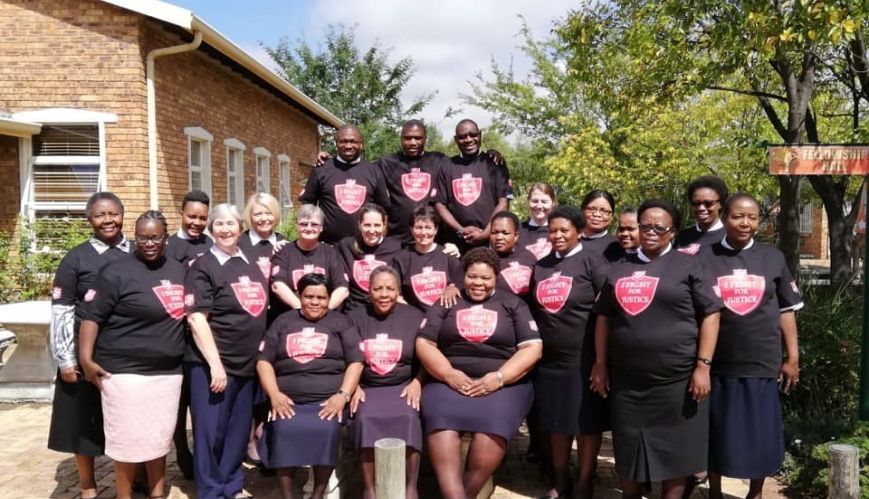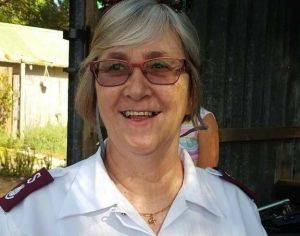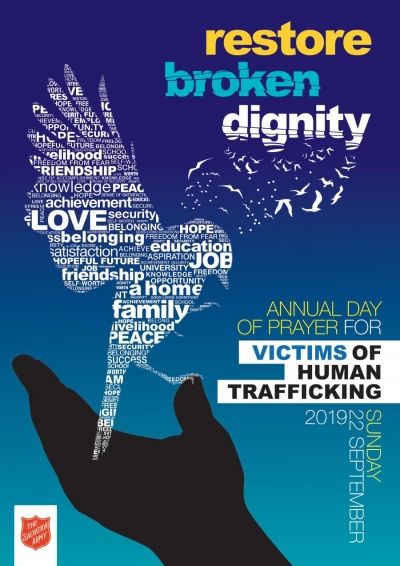
Fighting human trafficking in South Africa
Delegates at the anti-human trafficking ‘Train the Trainer’ workshops at eMseni are now equipped to educate others in awareness and response throughout their local areas.
Human trafficking is a worldwide crime enslaving and destroying the lives of millions of people while making billions of dollars for its perpetrators. Simone Worthing spoke to Major Margaret Stafford, National Coordinator for Anti-Human Trafficking in the Southern Africa Territory, about human trafficking in South Africa, and the work of The Salvation Army there in combatting this insidious global crime.
Simone Worthing: How big is human-trafficking in South Africa (SA), and what are the main forms it takes?
Margaret Stafford: At the moment South Africa has a huge problem with getting accurate statistics. As a country, we are working on this problem, but I don’t think we are anywhere near solving the numbers game. So far, the country has only been documenting those who have agreed to go through the system and assist the government in the legal side of things. If someone wants to go back to their home country without being of assistance to law enforcement, the country helps to make arrangements for the person to return home and they are not recorded as victims in our country. Hopefully, this will change soon. We are working on a new data tool developed by the National Prosecuting Authority.
 Major Margaret Stafford – helping restore broken lives.
Major Margaret Stafford – helping restore broken lives.
The main form of trafficking in SA, according to the International Labour Organisation, is labour trafficking. We have recently had two very big sweatshops in KwaZulu Natal (coastal province including the city of Durban) being shut down and a court case is pending. As an organisation, we have been very involved in assisting sex-trafficking victims. We are also seeing under-age marriages for which the perpetrators have received jail sentences, as well as a few cases of organ trafficking.
SW: Where are people trafficked from, and to?
MS: We have a lot of internal trafficking happening in the country, but we are also a transit nation – slaves come into the country headed for another destination; a receiving nation – slaves come into the country; and a sending country – slaves leave the country. Most of our victims are coming from Africa – mainly Ethiopia, Malawi and Mozambique, as well as Zimbabwe, Moldova and Taiwan.
SW: What are the main demographics of those trafficked?
MS: The majority of victims are women and children of all races, but mainly African and Taiwanese.
SW: What is The Salvation Army doing to help combat this problem?
MS: The Salvation Army in South Africa has been working alongside The Salvation Army Sweden and Latvia Territory, and the Swedish government, since 2010. We are very active in raising awareness of the issue, which includes speaking in schools, various social clubs, churches and communities. We also have social centres that have, and still are, housing victims of trafficking. We have over the past four years trained all our social workers and caregivers in caring for victims as well as set up divisional anti-Human trafficking boards and have appointed a coordinator in every division. This year we trained every divisional director for women’s ministries and their coordinators as a trainer, giving them the resources needed to conduct a local training. We are excited to see the results of this training. This training happened as a result of a donation from the Anderstorpssalen in Northern Sweden. We are so grateful for their goodness to us.
SW: Why is TSA involved with anti-human trafficking work?
MS: Trafficking happens in every community in our country and too often we like to keep that idea on the fringe. Jesus did some of his best work there. We recognise the divine image in every single person and so want to bring the message of hope to everyone, especially those who, to all extents and purposes, have given up hope. We feel our mandate is to speak for the voiceless and to help victims get the compensation they deserve. We are actively involved in bringing about policy change to accommodate victims’ needs and to work alongside government to make sure victims get all the help they need. The Salvation Army has a well-respected voice in the anti-human trafficking field as we participate at provincial as well as national anti-human trafficking forums.
 The international day of prayer for victims of human trafficking is in September.
The international day of prayer for victims of human trafficking is in September.
SW: What are some of the outcomes of The Salvation Army’s programs and awareness raising?
MS: We run a ‘help line’ that has helped some not get trafficked in that we check out job opportunities and find out if they are real or a scam of some sort. We have helped parents who did not know what to do when their child had gone missing. We have assisted a young lady to return to her home, working alongside the International Organisation for Migration in that case. We have seen many communities asking their local Salvation Army for advice on these matters.
SW: What plans for this work does The Salvation Army have for the future?
MS: We have developed a school program and resources, based around a lion named Shumba, to help us spread the message to primary schools around South Africa. We know this will be very successful. Each division will be holding a basic human trafficking awareness training and we plan to develop each division according to the individual challenges found in their respective communities.
SW: For you, personally, why is this an area you are passionate about?
MS: I have been working with the broken for many years now. I ran Beth Shan (a Salvation Army shelter for female victims of domestic violence, human trafficking and other crimes) for six years, led anti-human trafficking workshops, and was a part of street ministry for four years in the city of Port Elizabeth. I have realised time and time again that people are desperate for hope. They want someone to care enough not to judge. For people to love unconditionally and for people to love even when they push you away. This is a difficult journey and not everyone can take it. I appreciate the fact that everything I do has a prayer covering. There are many people who pray a covering over me daily and I know it’s because of their love and their faithfulness that I can do what I do. I have connected with victims and have seen the result of a successful restoration process. I believe that it is possible to be restored and to become successful, productive members of a community with the right care and with the right skills. I dedicated my life to following God’s heartbeat and it has led me here. He has been faithful to me and I want nothing more than to be as faithful to his calling on my life.
SW: Is there anything else you would like to add?
MS: I am also very grateful for the leaders I have who have released me to do what I do. It’s not difficult to have a passionate crazy person who goes into brothels and goes to the streets to speak to prostituted persons, but they have really encouraged my involvement and my work. They have also been great at making sure I don’t overstretch myself, which can create its own problems. So the organisation of The Salvation Army has a wonderful history of coming alongside the lost, the lonely and the broken and I am very proud of the heritage and the actual work done by The Salvation Army worldwide, especially the work done in Africa, and more especially the work done in South Africa.
Resources for The Salvation Army International Day of Prayer for victims of human trafficking – including posters advertising the event in English, Spanish, French and Portuguese – can be downloaded here.

 Major Margaret Stafford – helping restore broken lives.
Major Margaret Stafford – helping restore broken lives. The international day of prayer for victims of human trafficking is in September.
The international day of prayer for victims of human trafficking is in September.